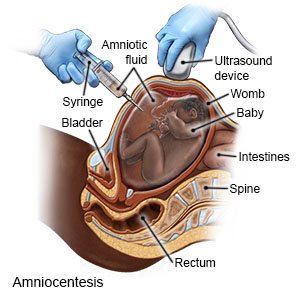Oligohydramnios
Medically reviewed by Drugs.com. Last updated on May 6, 2024.
What is oligohydramnios?
Oligohydramnios is a condition that causes you to have too little amniotic fluid during pregnancy. This fluid surrounds your unborn baby in the womb. Oligohydramnios can happen at any time during the pregnancy. It is most common in the third trimester.
Why is amniotic fluid important during pregnancy?
Amniotic fluid helps your baby grow and develop normally. The fluid does the following during pregnancy:
- Protects your baby from injury
- Protects the umbilical cord and keeps it from being pinched
- Helps your baby's lungs develop, and helps him or her exercise his or her muscles and digestive system
- Keeps your baby's temperature regular and protected from infection
- Prevents contractions from starting early
What causes oligohydramnios?
Amniotic fluid starts to develop in the womb soon after conception. The fluid contains mainly urine from the unborn baby by the end of the pregnancy. The baby normally swallows amniotic fluid and then urinates. This keeps the fluid level steady throughout pregnancy. The following can cause oligohydramnios:
- Any medical condition that affects your baby's ability to urinate, such as problems with his or her kidneys or urinary tract
- The placenta pulls away from the uterus, or cannot bring enough blood to the baby
- Membranes in the womb rupture (tear) before labor, called premature rupture of membranes (PROM)
- Fetal growth problems from intrauterine growth restriction
- Pregnancy that continues past the due date
- Pregnancy with more than one baby
- Medical problems in the mother, such as diabetes, preeclampsia, high blood pressure, smoking, or dehydration
What are the signs and symptoms of oligohydramnios?
- Less amniotic fluid than expected for the trimester
- Smaller uterus size than expected for the trimester
- Smaller abdomen size than expected for the trimester
- Slow heartbeat of the baby
- Baby is easy to feel when a healthcare provider touches the mother's abdomen
- Fewer movements than usual from the baby
- Amniotic fluid leaking from the mother's vagina
How is oligohydramnios diagnosed?
Your healthcare provider will examine you and ask about your symptoms. Tell him or her if your baby is moving less than usual, or if any fluid leaked from your vagina. Tell him or her about all medicines you are taking. You may need any of the following:
- Ultrasound pictures are used to find the amount of amniotic fluid in the womb. The pictures may also show the baby's size. His or her kidneys and urinary tract will be checked. Moving ultrasound pictures are used to check blood flow through arteries in the baby's kidneys and through the placenta.

- A fetal nonstress test is used to check your baby's movements. Your healthcare provider may also have you do kick counts. This means counting the number of times you feel your baby move in an hour.
- A biophysical profile is a test that checks the baby's breathing and movement. It also checks for the amount of amniotic fluid in the womb.
- Amniocentesis is a procedure used to take a sample of amniotic fluid from the womb. The fluid contains cells that can be tested for birth defects and other problems.

How is oligohydramnios treated?
- Delivery may be recommended if your baby is close to being full term.
- An amnioinfusion is a procedure to inject fluid into the womb. The fluid may help take pressure off the umbilical cord. During labor, your healthcare provider puts a catheter (thin tube) through your cervix. Fluid is put through the catheter and into the womb.
What are the risks of oligohydramnios?
Your baby's lungs may not develop correctly. He or she may be born smaller than expected. The umbilical cord may be pinched. This may prevent oxygen from getting to his or her brain and can cause brain damage. Your baby may breathe in meconium (his or her first bowel movement) during delivery. This can be life-threatening. Meconium may stain the amniotic fluid. He or she may be born with clubfoot, or the bridge of his or her nose may be flattened. You may need to have a cesarean section (C-section). You may have a miscarriage or stillbirth.
What can I do to care for myself until delivery?
- Drink more water to stay hydrated. Ask your healthcare provider how much liquid to drink each day.
- Bed rest may be needed if you are not ready to deliver. Your healthcare provider may recommend bed rest for several weeks of your pregnancy.
How can I lower my risk for oligohydramnios in a future pregnancy?
- Do not smoke. Nicotine in cigarettes increases the risk for PROM or problems with the placenta. Nicotine also causes low birth weight and other medical problems for the baby. Do not use e-cigarettes or smokeless tobacco in place of cigarettes or to help you quit. They still contain nicotine. Ask your healthcare provider for information if you currently smoke and need help quitting.
- Eat a variety of healthy foods. Healthy foods include fruits, vegetables, low-fat dairy products, lean meats, and beans. Healthy foods can help you gain a healthy amount of weight during pregnancy, and prevent diabetes.

- Take prenatal vitamins as directed. The vitamins should contain at least 4,000 micrograms of folic acid. Folic acid helps prevent birth defects such as spina bifida. Your healthcare provider can help you choose a prenatal vitamin that is right for you.
- Drink liquids as directed. More liquid can help prevent dehydration and high blood pressure. Liquids can help prevent PROM. PROM can cause fluid to leak out of the amniotic sac.
- Control diabetes or other medical conditions. Diabetes can cause problems for your baby, such as too much weight gain. If you have diabetes, work with your healthcare provider to manage your blood sugar levels before and during your next pregnancy.
When should I seek immediate care?
- You have clear fluid leaking from your vagina.
- You have heavy bleeding or any bleeding from your vagina for more than 24 hours.
- You have vision changes or problems, such as blurred vision.
When should I contact my healthcare provider?
- Your baby is moving less than usual.
- You have a fever or chills.
- You have contractions before you are due.
- You have cramps, pressure in your abdomen, or a low backache.
- You have questions or concerns about your condition or care.
Care Agreement
You have the right to help plan your care. Learn about your health condition and how it may be treated. Discuss treatment options with your healthcare providers to decide what care you want to receive. You always have the right to refuse treatment. The above information is an educational aid only. It is not intended as medical advice for individual conditions or treatments. Talk to your doctor, nurse or pharmacist before following any medical regimen to see if it is safe and effective for you.© Copyright Merative 2024 Information is for End User's use only and may not be sold, redistributed or otherwise used for commercial purposes.
Further information
Always consult your healthcare provider to ensure the information displayed on this page applies to your personal circumstances.
